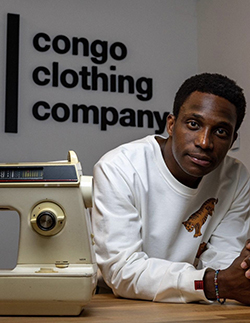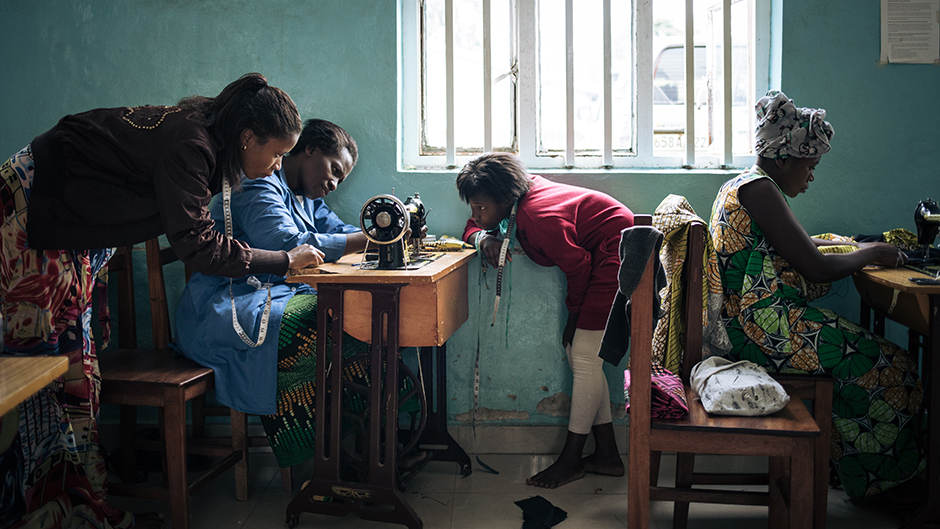As an undergraduate economics and finance student at the University of Miami College of Arts and Sciences, and later as a graduate student at MIT, Milain Fayulu was acutely aware of his good fortune in receiving what he called “a great education in the United States”—in stark contrast to the lack of comparable opportunities in the country of his birth.

For decades, the Democratic Republic of Congo (DRC) has been embroiled in political instability and armed conflict, with only intermittent periods of peaceful economic growth. Since the mid-1990s, rival militias have claimed millions of lives and transformed large areas of the country into conflict zones, with devastating consequences for the Congolese people.
Fayulu has long been compelled to do what he can to uplift his fellow Congolese by connecting his entrepreneurial ambitions, first nurtured in Miami, to the problems and possibilities of the DRC.
“I live so far away from home, where people don’t have the opportunities [that I have had],” he said. “To not put these opportunities to use in the service of my country would be a failure of my duty to push the country forward and use my skills as a way to give back.”
In 2022, Fayulu founded Congo Clothing Company, an ethical clothing brand inextricably linked to efforts to help the most vulnerable victims of the DRC’s ongoing trauma—women and girls.
Congo Clothing Company started online, offering a range of apparel and accessories whose geometric motifs evoke the centuries-old patterns woven by women of the Kuba kingdom, which was at the heart of the present-day DRC. Recently, the company opened its first brick-and-mortar store in Miami’s Wynwood neighborhood, and it has developed a business-to-business model providing custom merchandise for restaurants, universities, and other clients.
A percentage of Congo Clothing Company’s profits fund sewing workshops for Congolese women who have been victims of sexual violence during the country’s civil conflicts. Since its founding, the company has helped dozens of women complete 11,000 days of training, and Fayulu aims to reach 25,000 days by the end of 2024.
As Fayulu explained, the training helps these women get on the path to self-sufficiency—and self-respect. “If you learn how to do something and become a productive member of society, that improves the healing process,” he said. “It gives these women a great sense of ‘I’m worthy.’”
Fayulu’s inspiration for creating Congo Clothing Company came from the work of fellow Congolese Dr. Denis Mukwege. Mukwege is a physician and human rights activist who received the Nobel Peace Prize in 2018 in recognition of his efforts to end the use of sexual violence as a weapon of armed conflict.
In 1999, Mukwege founded Panzi Hospital in the eastern region of the DRC, close to the central conflict zones. The hospital specializes in treating survivors of conflict-related sexual violence, and Mukwege quickly became—reluctantly, according to Fayulu—one of the foremost experts in treating this type of trauma.
“I became very familiar with Dr. Mukwege’s work when he was awarded the Nobel Peace Prize, and as a Congolese, I was very proud,” Fayulu recounted. “I felt compelled to help and asked how we can raise awareness of and help advance his mission. This led to the idea of pitching Congo Clothing Company.”
In developing his idea and business model, Fayulu leaned into Mukwege’s organization to gain greater insight into the latter’s mission, and a partnership was born. As Fayulu explained, Panzi Hospital employs a holistic approach to caring for its patients, with four pillars: medical, psychological, legal, and socioeconomic. Congo Clothing Company intervenes on the fourth pillar.
Fayulu noted, “We provide these women with safe spaces and access to skills, which in turn helps our society advance. The more financially independent women are, the more they [can] invest in their families and communities. [We believe] that starting with women is a good place to put a country on the path to development.”
Congo Clothing Company is not Fayulu’s first business venture. At the University of Miami, he got the idea for Eben Naturals, a line of skincare products geared toward people of color. He was inspired by a visit back home to the DRC, where he noted the widespread use of toxic skin-bleaching products. He wanted to encourage people to embrace their natural skin tone.
With no business experience, Fayulu turned to The Launch Pad, the U’s incubator where aspiring entrepreneurs can start, build, and scale their startup businesses.
“The Launch Pad helped me frame my idea within the lens of a real business,” Fayulu recalled. “They showed me how to come up with a business model and about market segmentation, operating agreements, and other strategic elements that are easy to overlook. They helped me pave the way from an idea to a real business while avoiding pitfalls.”
As for Congo Clothing Company, it has embarked on the next stage of its journey by working toward establishing a sewing workshop in Kinshasa, the DRC’s capital, to train conflict survivors and survivors of domestic violence. “We benefited from Panzi’s aura and infrastructure, and now see an opportunity to go beyond and start rolling out independent workshops. We can scale our impact much faster,” Fayulu said.
Fayulu envisions a future where his efforts catalyze a robust textile industry in the DRC, such as those in southeast Asia and elsewhere. As he said, the idea is to “start modestly and aim for vertical integration with cotton growers and exports to developed countries. There are opportunities for countries in Sub-Saharan Africa to develop this type of ecosystem.”
Wherever his entrepreneurial journey takes him, it is clear from speaking with Fayulu that he is animated by a profound sense of purpose. The fundamental questions that guide him are: “What is my purpose? How can I add value to this world?”

